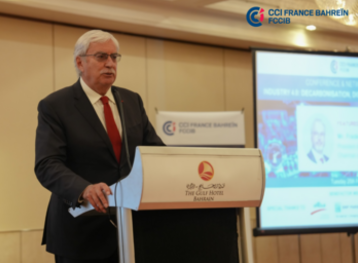Lifting lockdown: France looks ahead to options for easing coronavirus restrictions
Countries hit hard by the coronavirus are watching for a flattening of the curve to indicate the fight to tame the pandemic is gaining ground. Although France looks set to remain in lockdown for most of April and possibly longer, questions are already being raised as to how to lift a nationwide lockdown.
France's Prime Minister Édouard Philippe was grilled by fellow MPs at the National Assembly on Thursday, asked to explain what strategies were being considered for how to ease the country out of its coronavirus lockdown (or confinement in French).
The French government, Philippe said, hoped to be able to present the "outline of a strategy in the coming days on how to ease the confinement".
France has been on a total lockdown since March 17, with all non-essential trips from home banned and people unable to leave their homes without a signed and dated permission form. Among the sanctioned reasons for going out are shopping for necessities, visits to the doctor, to walk the dog or for brief exercise.
On March 27 the initial 15-day stay-at-home order was extended to April 15, with the prime minister saying this week that a second extension would likely follow.
The French government has so far kept tight-lipped on its options for loosening the restrictions imposed to curb the coronavirus. There is plenty of speculation from experts, however, on how and when the lockdown might be lifted. Below are some of the possible scenarios.
Lift all restrictions at once after collective immunity
"It is likely that we are not going to see an end to confinement that would happen in one move everywhere and for everyone," Philippe replied, when asked about the timeframe and process for lifting the lockdown.
He stressed that any decision "will take into account, above all, the public health considerations".
Karine Lacombe, head of the department of infectious diseases at the Saint-Antoine Hospital in Paris, told FRANCE 24 that a sudden end to all confinement measures would risk exposing untold numbers of people to the virus.
"This would lead to a second wave of infection that would once again lead to an overburdening of our healthcare services," Lacombe warned.
According to Chloé Hecketsweiler, a health journalist with Le Monde, the key to preventing a second wave of infections is "sequential and differential containment”.
“This is important because the peak of the epidemic is not going to happen everywhere at the same time. We've all been confined at the same time, but the virus spreads differently in different regions.”
To defeat the virus once and for all, the population must achieve collective immunity. According to this principle – also known as herd immunity – when the infection spreads through a population, more and more people become resistant ahead of a possible second wave of viral infections. This eventually leads to most of the population acquiring a level of immunity to the virus.
Easing lockdown by region, with mass testing
Philippe described the process of ending France’s mandatory confinement as "frighteningly complex", saying there was "no precedent" or "proven method" for doing so.
The prime minister cited the possibility of easing lockdown measures on a region-by-region basis and "subject to a new testing policy – depending, possibly, on age and other factors". It’s a scenario similarly touted in Italy – one of the countries hit hardest by the virus – where Prime Minister Giuseppe Conte has said that a "return to normalcy" will have to be achieved "gradually".
But a partial lifting of restrictions would nevertheless depend on several factors, including managing certain logistical and technical challenges.
Regional changes to confinement restrictions would have to be accompanied by massive testing, according to Arnaud Fontanet, an epidemiologist at the Pasteur Institute and a member of the Scientific Council advising the French government on the coronavirus.
“We will have to be ready,” Fontanet said in an interview with Europe 1. France would need an extensive capacity for testing and dedicated teams to "identify and isolate outbreaks very locally".
"We would need all of the oversight possible, and to decide who can and how we can resume the services necessary for everyone and for the economy," he explained.
This would see a return to the idea of isolating virus "clusters" – closing off areas where outbreaks of infection occur – a policy the government used to contain the virus in its early days.
In line with recommendations by the World Health Organization, the French government has already opted to embark on widespread testing. This could help prepare the ground for a regional loosening of restrictions.
French Health Minister Olivier Véran told a press conference on March 28 that France would have "50,000 tests" per day by the end of April, after which “more than 100,000 rapid test kits” would be added in June.
Easing confinement by age group
In another possible scenario, broached by the French prime minister and advocated by epidemiologist Fontanet, those most vulnerable to the virus such as the elderly would undergo prolonged periods of self-isolation or quarantine until herd immunity is reached.
"These people will have to remain confined for longer. For those age 60 and over, there is a higher risk of developing more serious symptoms or complications and dying from the virus," said Fontanet, who has strongly recommended more stringent regulations in retirement and nursing homes to protect their residents.
"We will have to remain extremely vigilant, because if they were exposed to the virus again they would be more likely to develop severe symptoms."
This would allow larger segments of the population who are less vulnerable to the virus to be released from restrictions more quickly and lead to a faster uptick in the country’s economic recovery.
'Stop-and-go' confinement: a tricky option
A report by a team of epidemiologists from Imperial College London led by Dr Neil Ferguson made headlines in mid-March when it posited that social distancing might need to last a staggering 18 months or more, at least intermittently, until a vaccine becomes available.
"One of the first strategies devised was a ‘stop-and-go’ policy," Hecketsweiler explained. "After the first wave of infections, the population is released and returns to its former way of life. The virus recirculates – which then requires new containment to avoid swamping the health systems – and so on, until herd immunity is achieved."
She added that while herd immunity "works on paper", it would likely be difficult to implement, especially in the long term.
"It doesn't necessarily work in real life. People are going to get bored; the containment is complicated to maintain," she said.
"Politically, this scenario is difficult to justify and economic life can’t just bounce back."
Widespread surveillance: ‘not on the agenda’
Leaning on "Big Brother" to track carriers of the virus electronically sounds like a plot device taken straight out of the dystopian TV series “Black Mirror”. In China and South Korea, it formed part of a suite of hard-line containment policies adopted to stop the spread of the coronavirus.
It might seem improbable that Western governments would contemplate, let alone adopt, tools that contravene some of the civil liberties that underpin a democracy. But politicians in Germany are seriously weighing in on the side of surveillance. Inspired by a system in place in Singapore, the German government wants to use mobile phone technology to identify and track people who have been in contact with an infected person.
Any suggestion that France might go as far as to rely on geolocation in its fight against the virus were immediately dismissed by the French prime minister as illegal.
"In some countries, this has served to isolate people who were ill or who had been close to someone who was ill,” Philippe acknowledged. “In France, it would not be legally permitted."
French news site Numerama reported this week that Philippe said he would not rule out developing new tools "to trace the circulation of the virus". But if they were to became available, he said, it would be up to citizens to choose whether or not to use them.


